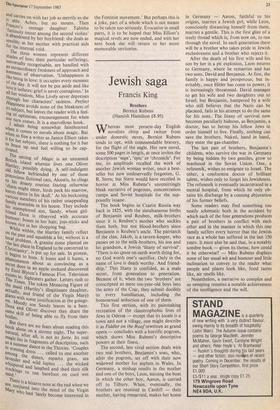Jewish saga
Francis King
Brothers
whereas most present-day English novelists chirp and twitter from under domestic eaves, Bernice Rubens tends to opt, with commendable bravery, for the flight of the eagle. Her new novel, some 500 pages in length, at once invites the description 'saga', 'epic' or 'chronicle'. For me, its amplitude recalled the work of another Jewish woman writer, once a best- seller but now undeservedly forgotten, G. B. Stern; but Stern would have recoiled in horror at Miss Rubens's unremittingly bleak narrative of pogroms, concentration camps and Soviet hospitals for the sup- posedly insane.
The book begins in Czarist Russia way back in 1825, with the simultaneous births of Benjamin and Reuben, milk-brothers since it is Reuben's mother who suckles them both, but not blood-brothers since Benjamin is Reuben's uncle. The patriarch of the clan, Jakob, is a tavern-keeper, who passes on to the milk-brothers, his son and his grandson, a Jewish `litany of survival': 'There is no cause on earth worth dying for, no God worth one's sacrifice. Only in the name of love is death worthy. And friend- ship.' This litany is confided, as a male secret, from generation to generation. Because of it, when the two 'brothers' are conscripted as mere ten-year-old boys into the army of the Czar, they submit docilely to every humiliation, including the homosexual seduction of one of them.
This first section, with its painstaking recreation of the claustrophobic lives of Jews in Odessa — except that its locale is a town and not a village, one might describe it as Fiddler on the Roof rewritten as grand opera — concludes with a horrific pogrom, which shows Miss Rubens's descriptive powers at their finest.
The second, less vivid section deals with two real brothers, Benjamin's sons, who, after the pogrom, set off with their now widowed mother for asylum in Wales. In Germany, a mishap results in the mother and one of the boys, Leon, missing the boat in which the other boy, Aaron, is carried off to Tilbury. When, eventually, the brothers are reunited in Cardiff — their mother, having remarried, makes her home in Germany — Aaron, faithful to his origins, marries a Jewish girl, while Leon, consciously distancing himself from them, marries a gentile. This is the first glint of a steely thread which is, from now on, to run through the novel. In each generation there will be a brother who takes pride in Jewish exclusiveness and a brother who rejects it.
After the death of his first wife and his son by her in a pit explosion, Leon returns to Germany, where he remarries and has two sons, David and Benjamin. At first, the family is happy and prosperous; but in- evitably, once Hitler has come to power, it is increasingly threatened. David manages to get his wife and two daughters out to Israel; but Benjamin, hampered by a wife who still believes that the Nazis can be placated, fails in his attempt to do the same for his sons. The litany of survival now becomes peculiarly hideous, as Benjamin, a doctor, has to betray his fellow Jews in order himself to live. Finally, nothing can save the brothers. Naked, hand in hand, they enter the gas-chamber.
The last pair of brothers, Benjamin's children, who survive the war in Germany by being hidden by two gentiles, grow to manhood in the Soviet Union. One, a refusenik, wishes to emigrate to Israel. The other, a conformist doctor of brilliant talent, wishes only to forget his Jewishness. The refusenik is eventually incarcerated in a mental hospital, from which he only ob- tains his discharge by a cunning abjuration of his former beliefs.
Some readers may find something too neatly schematic both in the accident by which each of the four generations produces a pair of brothers in conflict with each other and in the manner in which this one family suffers every horror that the Jewish race as a whole has suffered in the last 150 years. It must also be said that, in a notably sombre book — given its theme, how could it be otherwise? — Miss Rubens displays none of her usual wit and humour and little inclination to convey to the reader what people and places look like, food tastes like, air smells like.
Nonetheless, a narrative so complex and so sweeping remains a notable achievement of the intelligence and the will.






































 Previous page
Previous page